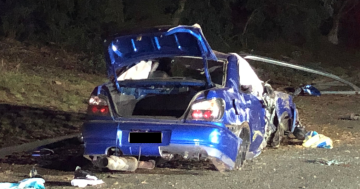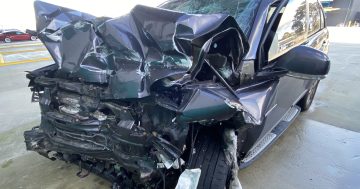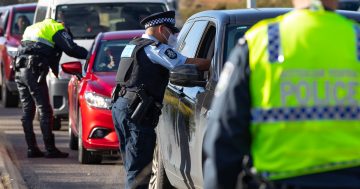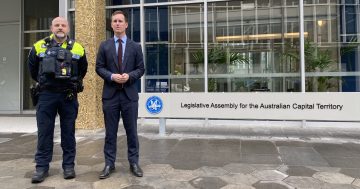
Police in the ACT will be given powers to immediately remove dangerous drivers and repeat offenders from the road under a new law. Photo: Michelle Kroll.
The ACT Government has passed the Road Safety Legislation Amendment Bill 2022, giving the police new powers to tackle dangerous drivers after last year marked Canberra’s worst yearly road toll in more than a decade.
Under the new bill, if an offender exceeds a posted speed limit by more than 45 kilometres per hour, they will be issued a mandatory immediate licence suspension by ACT Police. In a first for the ACT, police will also have the power to seize and impound a vehicle caught exceeding the limit by more than 45 km/h.
Drivers found to be repeatedly engaging in racing and hooning could face a fine of up to $16,000 or a 12-month prison sentence. The same penalty may be imposed on first-time offenders if the behaviour is aggravated, for example if there is a minor present when the offence is committed.
“This is an important legislative step to address some of the higher-end dangerous driving we have seen over the past few years. Last year was the worst year in terms of our road toll for the last decade, and this will go some way to helping to address that kind of behaviour,” Minister for Transport and City Services Chris Steel said on Wednesday (7 June).
“But ultimately, it is also up to individuals on our roads to make sure they’re looking out for other people and taking responsibility for their own safety.”
The ACT Government also plans to roll out a community education and awareness campaign later this year highlighting the dangers of reckless driving and the penalties drivers will face.
Eighteen people were killed on the ACT’s roads in 2022, the highest number since 2010. The Territory’s average road toll over the past decade is 11.
“We know dangerous driving was a significant contributor to this increased road toll in the ACT last year,” Minister Steel said, explaining why reforms to crack down on reckless driving were so necessary.
The ACT Government has also been reviewing the road transport penalties framework to raise awareness and educate drivers on road safety. This process has involved consultation from ACT Policing, the AFP Association and the community.
“All parties involved in this reform agree that road safety is everyone’s responsibility as we strive for Vision Zero, which is no deaths or serious injuries on Canberra’s roads,” Mr Steel said.
Australian Federal Police Association (AFPA) president Alex Caruana said he welcomed the new powers, which the association had been calling on the government to implement for some time. He also said it was a credit to the ACT Government that it moved relatively quickly to bring in the legislation after 2022’s “tragic” road toll, which would serve as a permanent reminder of how dangerous roads could be.
“I’ve had many ACT Policing members tell me it was galling to watch a motorist drive away after being caught excessively speeding,” he said.
“This legislation now puts motorists who choose to excessively speed and drive dangerously on notice. Not only will you get a whopping fine, but you’ll also face an immediate licence suspension and the possibility of having your car seized.”
The new legislation also implements recommendations from the coronial inquest into the death of Blake Corney, a four-year-old boy killed when a truck crashed into the back of his family’s car in 2018.
The driver was found to have had a possible diagnosis of sleep apnea dating from five years before the crash, but this had not been declared when he applied for his job in 2017 or when he renewed his heavy vehicle driver’s licence in 2018. The inquest highlighted that it was insufficient to rely on individuals self-reporting on road safety and recommended a number of changes to ensure heavy vehicle drivers undertook health examinations and introduced mandatory reporting of truck drivers with potential health conditions.
Under the new law, medical practitioners will be required to report information relating to a person’s fitness to drive to the Road Transport Authority (RTA).
Tom McLuckie, who began the Actnowforsaferroads campaign after his son Matthew was killed in a collision on Hindmarsh Drive in 2022, said the legislation was a “positive start”, which brought the ACT in line with other states such as Victoria in terms of anti-hooning laws.
“It will need to be seen how the courts apply the legislation and penalties,” he said.
“We have existing legislation for example around failure to stop for the police, aggravated dangerous driving and yet tend to be extraordinarily lenient. Having a maximum sentence and applying the yardstick in our sentencing are two entirely different things.
“Time will tell if the courts in their decisions are going to be prepared to apply sentences that will provide deterrence and punishment or continue to favour rehabilitation as the only purpose of sentencing that matters.”





















